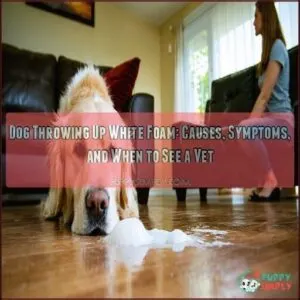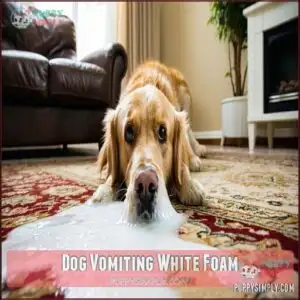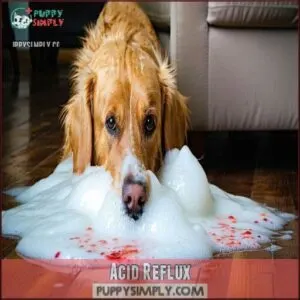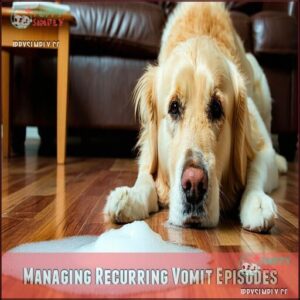This site is supported by our readers. We may earn a commission, at no cost to you, if you purchase through links.
 If your dog is throwing up white foam, it might mean their stomach is upset, or they’re dealing with acid reflux. Sometimes, it happens if they’ve eaten too quickly or gone too long without food.
If your dog is throwing up white foam, it might mean their stomach is upset, or they’re dealing with acid reflux. Sometimes, it happens if they’ve eaten too quickly or gone too long without food.
But don’t shrug it off—white foam can also point to more serious issues like kennel cough, pancreatitis, or even a blockage.
Watch for other signs like lethargy, loss of appetite, or trouble breathing. If the vomiting keeps happening or your dog seems uncomfortable, it’s time to call the vet.
A quick check-up can rule out major concerns and get your pup feeling better in no time.
Table Of Contents
- Key Takeaways
- Dog Vomiting White Foam
- Causes of White Foam Vomit
- When to Seek Veterinary Care
- Diagnosing White Foam Vomit
- Treating White Foam Vomit
- Preventing White Foam Vomit
- Helping Your Dog Recover
- Managing Recurring Vomit Episodes
- Frequently Asked Questions (FAQs)
- What should I do if my dog is throwing up white foam?
- Is white foamy vomit bad?
- When should I be concerned about my dog throwing up?
- What does parvo vomit look like?
- Why is my dog vomiting white foam?
- Can rabies cause a dog to vomit white foam?
- Why does my dog spit up white foam?
- Is it normal for a dog to throw up white foam?
- Why is my dog throwing up white foam slime?
- What does it mean when your dog is throwing up white mucus?
- Conclusion
Key Takeaways
- Keep an eye on your dog if they’re vomiting white foam, as it could be due to an empty stomach, acid reflux, or something serious like a blockage or toxins.
- Don’t delay calling your vet if symptoms persist, worsen, or are paired with lethargy, diarrhea, or difficulty breathing.
- Make sure your home environment is safe by storing toxic items out of reach and offering only a balanced diet to prevent stomach issues.
- Slowly reintroduce food and water after vomiting, starting with small amounts of bland food like boiled chicken and rice, while keeping your dog hydrated.
Dog Vomiting White Foam
When your dog throws up white foam, it can be a sign of irritation in their stomach or digestive system.
Understanding the possible causes can help you decide when to monitor at home and when to contact your vet.
Definition and Composition
White foam vomit happens when air mixes with bile during vomiting, usually because your dog’s stomach is empty.
Air and bile mixing creates white foam vomit, often from an empty stomach or interrupted digestion.
The foam appearance results from the digestion process being interrupted, creating a frothy consistency. If your dog is vomiting foam, it may look alarming but doesn’t always mean something serious.
Pay attention to the vomit consistency and frequency to assess its condition.
Common Causes and Symptoms
When your dog is throwing up white foam, it often points to common issues.
Causes include an empty stomach or acid buildup irritating the digestive system.
Watch for symptoms like:
- Dietary indiscretion, such as eating spoiled food.
- Toxin exposure, like household cleaners.
- Respiratory issues, such as kennel cough leading to foam.
If symptoms persist, seek your vet’s advice.
Causes of White Foam Vomit
When your dog throws up white foam, it can be caused by several issues like acid reflux, kennel cough, or even something they shouldn’t have eaten.
Understanding these potential causes can help you know when it’s time to take them to the vet.
Acid Reflux
An empty stomach or stomach acid backing into the esophagus—common reflux causes—can lead to dog vomiting foam.
This condition, known as dog acid reflux, happens when esophageal irritation occurs, often from poor dietary impact.
Medication options, like antacids, and preventative steps, such as regular, smaller meals, can help reduce white foam vomit and ease your pup’s discomfort.
However, specks of blood in the vomit warrant immediate veterinary attention.
Kennel Cough
Kennel cough, a common upper respiratory infection, can cause your dog to cough persistently, sometimes leading to white foam vomit.
This respiratory illness spreads quickly through coughing, sneezing, or sharing items.
The Bordetella vaccine helps build immunity, reducing risk. For mild cases, cough treatment and rest usually work, but preventing spread is key—avoid dog parks during outbreaks.
Pancreatitis
Pancreatitis, or pancreas inflammation, is a serious dog health concern that may cause your dog to vomit white foam.
Pancreatitis is a serious condition causing white foam vomit, abdominal pain, and appetite loss—seek your vet’s help right away.
Dog pancreatitis symptoms include abdominal pain, diarrhea, hunched posture, and appetite loss.
Pancreatitis diagnosis involves exams, blood work, or imaging.
Pancreatitis treatment focuses on IV fluids, pain relief, and dietary management.
Chronic pancreatitis often needs long-term care, including a low-fat diet.
Internal Blockage
When your dog’s stomach is upset and they’re vomiting white foam, an intestinal obstruction could be the culprit.
Swallowing foreign objects like socks often leads to blockage symptoms.
Here’s what happens:
- Vomiting without stool is a red flag.
- Diagnostic imaging, like an abdominal X-ray, confirms obstruction.
- Surgical removal and post-op care are essential parts of veterinary treatment.
Ingestion of Toxic Materials
Ingesting toxins, like household cleaners, toxic plants, or garden poisons, can make your dog vomit white foam.
Chemical exposure often causes repeated vomiting, weakness, or trembling—classic dog poisoning signs.
If you suspect toxin exposure, don’t wait—get veterinary help right away.
Prevention tips? Keep toxins out of reach, watch for signs of toxic ingestion, and act fast to protect your pup.
When to Seek Veterinary Care
If your dog keeps vomiting white foam or shows other signs like lethargy or diarrhea, it’s time to call your vet.
Waiting too long could make the problem worse, especially if something serious is going on.
Emergency Situations
If your dog is throwing up white foam, some situations need urgent care. Bloat symptoms, like a swollen belly or trouble breathing, could mean GDV—life-threatening!
Rapid collapse, severe dehydration, toxin ingestion, or blood present in the foam are big warning signs.
Don’t wait; call your vet immediately if you see:
- Breathing problems
- Vomiting with blood
- Swollen abdomen
- Weakness or collapse
Persistent and Severe Vomiting
If your dog is throwing up white foam persistently or severely, it’s a red flag.
Dehydration risks quickly escalate, and underlying diseases might be at play.
Persistent symptoms signal a potential medical emergency needing diagnostic urgency.
A vet visit isn’t optional here—delays could limit treatment options.
Identifying causes of vomiting early guarantees your dog gets the care they need promptly, which is crucial for preventing severe consequences and ensuring they receive the necessary attention in a medical emergency.
Accompanying Symptoms
When your dog shows more than just vomiting white foam, watch for additional symptoms.
Here’s what to look for:
- Lethargy signs like unusual tiredness or weakness.
- Appetite changes, such as refusing meals or treats.
- Diarrhea presence alongside vomiting.
- Abdominal pain, indicated by whining, restlessness, or discomfort when touched.
Persistent dog nausea symptoms signal serious dog health concerns—contact your vet promptly.
Diagnosing White Foam Vomit
To figure out why your dog is throwing up white foam, your veterinarian will start with a physical exam and questions about their history.
They may use tests like X-rays or bloodwork to uncover the cause and decide on the best treatment.
Physical Exam and Medical History
When your veterinarian evaluates your dog throwing up white foam, they’ll ask about the symptom timeline, breed predispositions, and environmental factors like exposure to toxins.
A physical exam may include abdominal palpation findings to check for pain or swelling.
They’ll review medications and diet history to uncover triggers. Be honest—it helps pinpoint causes and improve your dog’s health.
Sometimes, the color of the vomit can be informative, as yellow vomit indicates potential bile issues.
Diagnostic Tests (X-rays, Blood, Urine, Fecal Tests)
If your pet’s throwing up white foam, diagnostic tests help uncover the issue.
These tests include:
- X-rays: Spot blockages or bloat but have limitations in showing soft-tissue problems.
- Bloodwork: Reveals dehydration, infections, or organ issues.
- Urine and fecal tests: Identify parasites or kidney troubles.
Your vet interprets results carefully to pinpoint the cause for a solid diagnosis.
Endoscopy and Imaging Studies
When a dog is vomiting white foam, endoscopy and imaging studies help pinpoint gastrointestinal issues.
Endoscopy types reveal blockages or inflammation, while imaging accuracy from ultrasounds or X-rays aids diagnosis.
Biopsy collection reveals hidden causes, though anesthesia risks exist.
Cost comparison shows imaging can be pricey, but it’s essential for identifying vomiting causes, and always consult your veterinarian for guidance.
Treating White Foam Vomit
To treat your dog’s white foam vomit, you’ll need to address the root cause, whether it’s an empty stomach, acid reflux, or something more serious.
Follow your vet’s recommendations, which may include medication, dietary changes, or other treatments aimed at soothing their irritated stomach.
Surgery and Medication
If the vet determines a foreign body, surgery might be necessary to remove it.
After surgery, post-op care includes monitoring and following medication instructions carefully. Prescription medications, like anti-nausea drugs, help recovery but may have mild side-effects.
If surgery isn’t needed, alternative therapies or antacids may be recommended. Costs vary, so ask your vet for a cost analysis.
Dietary Changes and Management
After surgery or medication, focus on gradual diet introduction. Start with a bland diet—plain chicken and rice work well.
Check for food allergies and use portion control to aid recovery. Hydration is key; keep water accessible but limit gulping.
Some dogs benefit from supplements, but consult your vet. A well-managed dog diet helps reduce dog vomiting white foam episodes.
Many owners find specialized food products beneficial during recovery, using portion control.
Preventative Measures
Keeping your dog’s stomach happy starts with prevention.
Use these quick tips to avoid trouble:
- Stick to a consistent diet—no sudden menu surprises.
- Provide safe toys to avoid choking or blockages.
- Secure chemicals and keep them out of paw’s reach.
- Stay on top of vaccinations and parasite prevention for better wellness.
Simple steps keep tails wagging!
Preventing White Foam Vomit
You can prevent your dog from throwing up white foam by keeping harmful items out of reach and ensuring they’re eating a healthy, balanced diet.
Regular vet checkups, parasite control, and feeding routines can go a long way in keeping their stomach settled and happy.
Vaccinations and Parasite Control
Stopping white foam vomiting starts with good health practices. Core vaccines protect against illnesses like parvovirus, while deworming schedules target internal parasites.
Add heartworm prevention and flea control to shield against parasites causing distress. Ticks spread dangerous diseases, so check regularly.
Many owners find success using preventative dog medication to maintain their dog’s health. Stay on top of parasite infection prevention—it’s like building armor for your pup’s immune system!
| Key Area | Purpose | Action Needed | Frequency | Why It Matters |
|---|---|---|---|---|
| Core Vaccines | Disease prevention | Annual updates | As per vet schedule | Protects against parvovirus |
| Deworming | Internal parasite control | Regular medication | Vet-recommended | Removes intestinal parasites |
| Heartworm Care | Preventative medication | Monthly | All year | Stops dangerous infections |
| Flea Control | Prevent irritation and disease | Topical/oral meds | Monthly | Avoids skin problems, infections |
| Tick Checks | Defense against tick-borne diseases | Physical inspections | Weekly | Prevents serious health risks |
Safe Environment and Toxic Material Removal
A safe space is key to keeping your dog healthy and preventing white foam vomit from exposure to toxins.
Secure potential dangers and follow these tips:
- Household Hazards: Store chemicals like cleaners out of reach.
- Toy Safety: Remove broken toys to avoid choking hazards.
- Plant Toxicity: Research pet-safe plants and remove harmful ones.
Many lawn fertilizers contain toxic chemicals for pets.
Healthy Diet and Feeding Habits
Switching gear from toxins, let’s talk about feeding right.
Balanced nutrition helps your dog thrive, while portion control and a consistent feeding schedule keep stomach upset at bay.
Avoid dog dietary indiscretions by steering clear of table scraps.
Hydration matters too—keep clean water handy.
Here’s a quick guide:
| Tip | Why It Helps | Example Food |
|---|---|---|
| Balanced Diet | Prevents nutrient gaps | High-quality kibble |
| Portion Control | Reduces vomiting risks | Use measuring cups |
| Regular Meals | Stabilizes digestion | Twice per day |
| Avoid Allergens | Stops reactions | Grain-free options |
| Hydration | Supports digestion | Fresh water daily |
By following these guidelines, you can help ensure your dog receives the right nutrition and stays healthy.
Regular meals and a balanced diet are crucial for maintaining your dog’s overall well-being.
Helping Your Dog Recover
Helping your dog recover involves giving their stomach time to rest and reintroducing food and water slowly.
Keep a close eye on their behavior and symptoms, and contact your vet if anything seems unusual.
Home Care and Monitoring
If your dog is vomiting white foam, start with careful fasting and monitoring.
Watch for changes in behavior or worsening symptoms.
Here’s how to manage:
- Fasting Duration: Withhold food for 6–12 hours to rest their stomach.
- Hydration Monitoring: Offer small sips of water to avoid dehydration.
- Symptom Tracking: Log any new signs to share with your vet if needed.
Reintroducing Food and Water
After dog vomiting white foam, reintroduce water first.
Offer small portions and make water access available at all times.
Start a bland diet with easily digestible dog food, such as boiled chicken or rice.
A good option for recovery is easily digestible food.
Gradually increase food amounts while monitoring symptoms.
If digestive problems worsen, consult your vet.
Here’s a quick guide:
| Step | Action | Key Focus | Goal |
|---|---|---|---|
| 1 | Offer Water | Hydration | Prevent dehydration |
| 2 | Small Portions | Controlled Intake | Avoid upsetting the stomach |
| 3 | Bland Diet | Easy Digestion | Support recovery |
| 4 | Monitor Symptoms | Health Watch | Detect warning signs early |
This approach helps in managing the dog’s health after vomiting, ensuring proper care and quick recovery.
Managing Recurring Vomit Episodes
If your dog keeps throwing up white foam, it’s important to focus on finding the cause and managing it effectively.
Consistent care, such as tracking symptoms and following your vet’s advice, can help reduce these episodes over time, with effective management.
Identifying Underlying Causes
When your dog keeps throwing up white foam, pinpointing the cause is key.
Look into:
- Dietary indiscretion – Eating something unusual disturbs digestion.
- Gastroesophageal reflux – Stomach acid backs up, irritating the esophagus.
- Toxin exposure – Chemicals or plants upset the stomach.
Empty stomachs, inflammatory bowel issues, or other complications might also explain foamy vomit causes.
If you notice specks of blood, contact your vet immediately.
Consult your vet for diagnosis.
Long-term Treatment and Management
Addressing recurring episodes of dog vomiting white foam often means reinforcing habits like balanced dietary adjustments, sticking to medication schedules, and routine checkups.
Lifestyle changes, like controlled portion sizes or slow feeders, can help, and prioritizing relapse prevention by avoiding foods and items that upset your dog’s stomach is key.
Partnering with your vet guarantees long-term dog health through personalized dog treatment and dog health advice.
Reducing Stress and Anxiety
Stress can upset your dog’s stomach, leading to issues like dog vomiting white foam.
Create a safe space where they can relax. Calming techniques, like soft music or gentle petting, help reduce tension.
Exercise benefits both body and mind, easing separation anxiety.
Add mental enrichment with puzzles to keep them engaged and prevent stress-triggered dog nausea symptoms or vomiting episodes, which can be a result of tension.
Frequently Asked Questions (FAQs)
What should I do if my dog is throwing up white foam?
If your dog’s vomiting white foam, keep them calm, monitor closely, and withhold food for 6-12 hours.
Make certain access to water.
If symptoms persist, worsen, or other issues arise, contact your vet for advice.
Is white foamy vomit bad?
Not all white foamy vomit is alarming, but it can signal issues like an empty stomach, acid reflux, or more serious problems.
If it’s frequent, persistent, or paired with other symptoms, consult your vet promptly.
When should I be concerned about my dog throwing up?
You should worry if vomiting lasts over 24 hours, includes blood, or comes with lethargy, diarrhea, or a bloated belly.
Call a vet for frequent vomiting or if you suspect your dog ate something toxic.
What does parvo vomit look like?
Parvo vomit often looks yellow, brown, or clear with traces of mucus or blood, and it’s usually foul-smelling.
It’s a serious sign, especially if paired with diarrhea, lethargy, or loss of appetite.
Why is my dog vomiting white foam?
Your dog might be vomiting white foam due to an empty stomach, acid reflux, or mild indigestion.
However, it could also signal infections, toxins, or blockages.
Persistent vomiting needs a vet’s attention to guarantee safety.
Can rabies cause a dog to vomit white foam?
Rabid reactions rarely result in foamy vomiting, but rabies can cause excess drooling and neurological issues.
If your dog’s behavior changes suddenly, paired with vomiting or other symptoms, contact a vet right away—it’s imperative.
Why does my dog spit up white foam?
White foam often happens when your dog’s stomach is empty, or acid reflux kicks in.
It can also mean mild issues like indigestion or serious ones like toxins or blockages.
Watch for other symptoms.
Is it normal for a dog to throw up white foam?
When life throws a curveball, like your dog vomiting white foam, it’s not always a red flag.
It often signals an upset stomach, but persistent episodes or added symptoms mean it’s vet time.
Why is my dog throwing up white foam slime?
Seeing your pet throw up white foam slime might point to an upset stomach, acid reflux, or indigestion.
It could also signal something serious, like toxins or blockages.
Contact your vet if it continues.
What does it mean when your dog is throwing up white mucus?
Don’t panic—it could be as simple as an upset stomach or acid reflux.
White mucus in vomit often signals excess saliva or bile from an empty stomach, but if it persists, consult your vet.
Conclusion
When your dog is throwing up white foam, it’s like their body is waving a red flag.
It could be something simple like an empty stomach or something serious like an internal blockage.
Pay attention to symptoms like lethargy or loss of appetite, and don’t wait if vomiting continues.
A vet visit can pinpoint the cause and start treatment quickly.
Keeping toxic items away and maintaining healthy feeding habits can help your pup stay happier and healthier.
- https://www.vet.cornell.edu/research/faculty/brian-collins-dvm
- https://www.smalldoorvet.com/team/dr-robert-gonzalez
- https://vetericyn.com/blog/signs-and-symptoms-of-dog-indigestion/
- https://healthypets.mercola.com/sites/healthypets/archive/2014/12/28/gastroesophageal-reflux-disease.aspx
- https://www.merckvetmanual.com/endocrine-system/the-adrenal-glands/addison-disease




















